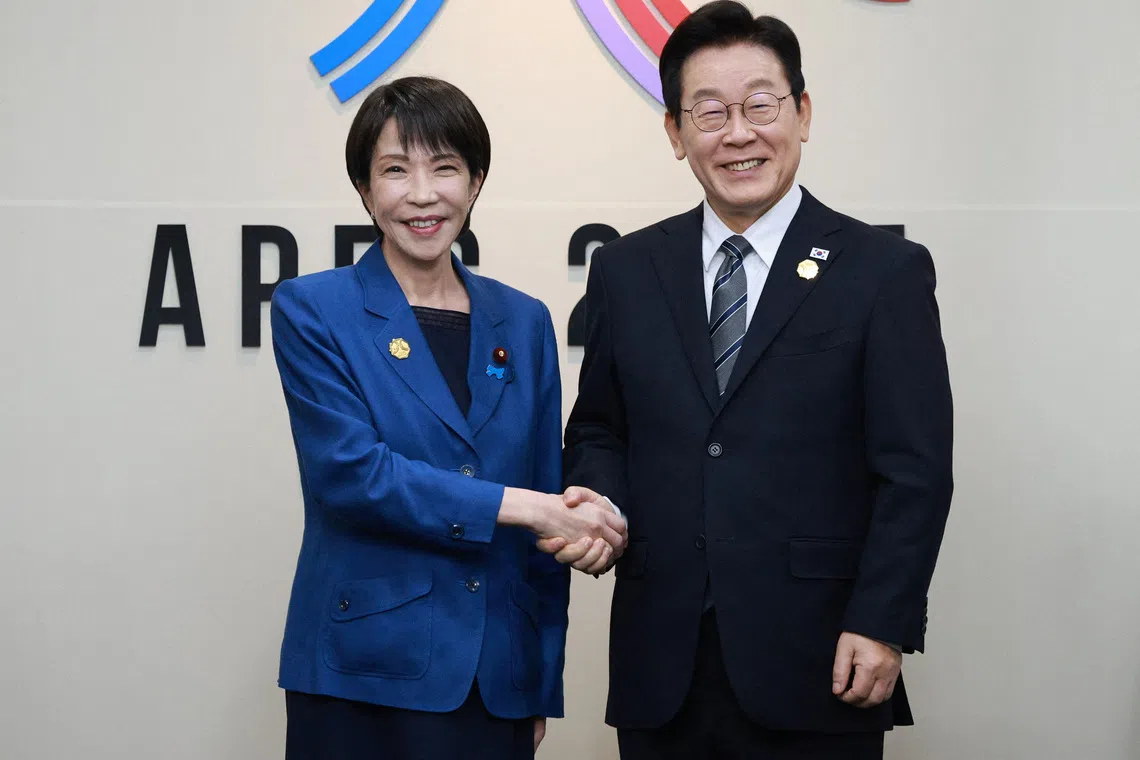Japan’s new PM, South Korean president stress importance of ‘forward-looking ties’ at first meeting
Sign up now: Get ST's newsletters delivered to your inbox

Japanese Prime Minister Sanae Takaichi meeting South Korean President Lee Jae Myung in Gyeongju on Oct 30.
PHOTO: REUTERS
Follow topic:
GYEONGJU, South Korea – South Korean President Lee Jae Myung and Japan’s new Prime Minister Sanae Takaichi both stressed on Oct 30 the importance of “forward-looking ties” as they held their first official talks.
Relations have long suffered over issues related to Japan’s brutal 1910 to 1945 occupation of the Korean peninsula and there have been concerns that ties could worsen under Ms Takaichi.
“In today’s rapidly changing international and trade environment, South Korea and Japan – as neighbouring countries with so many commonalities – must strengthen forward-looking cooperation more than ever before,” Mr Lee told Ms Takaichi at the meeting.
The Japanese leader, meanwhile, said there were “certain issues we disagree on precisely because we’re neighbours”.
“We agreed that we should exercise our leadership to take care of them, and develop our relationships in a future-oriented, stable manner,” said Ms Takaichi, who took office last week
The meeting took place at an Asia-Pacific Economic Cooperation (Apec) summit in Gyeongju, South Korea, that was also attended by Chinese leader Xi Jinping and, until Oct 30, US President Donald Trump.
War criminals
Before being elected Ms Takaichi, an acolyte of late former premier Shinzo Abe – whose relations with Seoul were terrible – regularly visited the Yasukuni shrine.
The site honours Japanese killed in combat, including convicted war criminals, and has long dogged Tokyo’s relations with both Seoul and Beijing.
Ms Takaichi, 64, has appeared to have toned down her nationalist image, staying away from a recent festival
After being elected, she said that she wanted to stabilise ties and likes “Korean seaweed, use Korean cosmetics and watch Korean dramas”.
South Korea’s former conservative president Yoon Suk Yeol sought to improve relations with Japan.
Mr Lee, who takes a relatively more dovish approach than Yoon towards North Korea, has said South Korea and Japan are like “neighbours sharing a front yard”.
“Caught between the US and China, Japan and South Korea have little choice but to cooperate, and both leaders are well aware of that,” Dr Lee Jae-mook, political science professor at the Hankuk University of Foreign Studies, told AFP.
“The concern, however, is that when their approval ratings fall, leaders in both countries tend to use Seoul–Tokyo relations for domestic political gain – through right-wing gestures like visits to the Yasukuni shrine, for instance,” he said.
Political commentator Park Sang-byung said Mr Lee “cannot, and will not, side with Japan the way Yoon Suk Yeol did”.
“The best-case scenario is that things don’t deteriorate – that Ms Takaichi doesn’t fully embrace the far-right, Abe-style approach, or blindly take Washington’s side in every trilateral issue despite the existing US-Japan–South Korea cooperation,” he said. AFP

